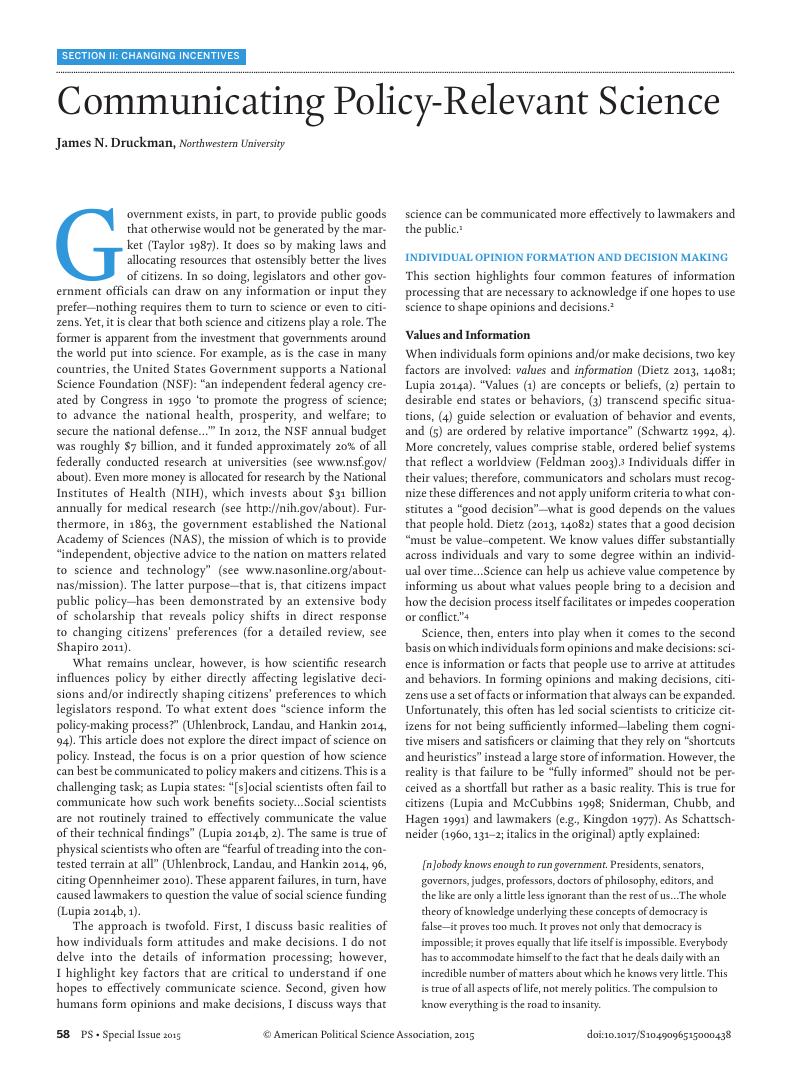Crossref Citations
This article has been cited by the following publications. This list is generated based on data provided by Crossref.
Palm, Risa
Lewis, Gregory B.
and
Feng, Bo
2017.
What Causes People to Change Their Opinion about Climate Change?.
Annals of the American Association of Geographers,
Vol. 107,
Issue. 4,
p.
883.
Bolsen, Toby
2017.
Political science: Partisans' science interests.
Nature Human Behaviour,
Vol. 1,
Issue. 4,
Bolsen, Toby
and
Druckman, James N.
2018.
Do partisanship and politicization undermine the impact of a scientific consensus message about climate change?.
Group Processes & Intergroup Relations,
Vol. 21,
Issue. 3,
p.
389.
Bolsen, Toby
Palm, Risa
and
Kingsland, Justin T.
2019.
Counteracting Climate Science Politicization With Effective Frames and Imagery.
Science Communication,
Vol. 41,
Issue. 2,
p.
147.
Pepper, Jessica K.
Squiers, Linda B.
Peinado, Susana C.
Bann, Carla M.
Dolina, Suzanne D.
Lynch, Molly M.
Nonnemaker, James M.
and
McCormack, Lauren A.
2019.
Impact of messages about scientific uncertainty on risk perceptions and intentions to use electronic vaping products.
Addictive Behaviors,
Vol. 91,
Issue. ,
p.
136.
Hardy, Bruce W.
Tallapragada, Meghnaa
Besley, John C.
and
Yuan, Shupei
2019.
The Effects of the “War on Science” Frame on Scientists’ Credibility.
Science Communication,
Vol. 41,
Issue. 1,
p.
90.
Brandts, Jordi
Busom, Isabel
Lopez-Mayan, Cristina
and
Panadés, Judith
2019.
Dispelling Misconceived Beliefs About Rent Control: Insights from a Field and a Laboratory Experiment.
SSRN Electronic Journal,
Masri, Shahir
Simolaris, Athina
Hopfer, Suellen
and
Wu, Jun
2020.
Assessment of Climate Change Sentiment, Engagement and Adaptation through a Community-Based Outreach Campaign and Questionnaire across the United States.
Earth,
Vol. 1,
Issue. 1,
p.
75.
Bolsen, Toby
Palm, Risa
and
Kingsland, Justin T.
2020.
Framing the Origins of COVID-19.
Science Communication,
Vol. 42,
Issue. 5,
p.
562.
Palm, Risa
and
Bolsen, Toby
2020.
Climate Change and Sea Level Rise in South Florida.
Vol. 34,
Issue. ,
p.
15.
Hendriks, Friederike
and
Jucks, Regina
2020.
Does Scientific Uncertainty in News Articles Affect Readers’ Trust and Decision-Making?.
Media and Communication,
Vol. 8,
Issue. 2,
p.
401.
Palm, Risa
Bolsen, Toby
and
Kingsland, Justin T.
2020.
“Don’t Tell Me What to Do”: Resistance to Climate Change Messages Suggesting Behavior Changes.
Weather, Climate, and Society,
Vol. 12,
Issue. 4,
p.
827.
Lupia, Arthur
2020.
Beyond the Pathogen: Social and Behavioral Aspects of COVID‐19.
World Medical & Health Policy,
Vol. 12,
Issue. 3,
p.
228.
Handmaker, O.
Keeler, B.L.
and
Milz, D.
2021.
What type of value information is most valuable to stakeholders? Multi-sector perspectives on the utility and relevance of water valuation information.
Environmental Science & Policy,
Vol. 115,
Issue. ,
p.
47.
Sambrook, Kate
Konstantinidis, Emmanouil
Russell, Sally
and
Okan, Yasmina
2021.
The Role of Personal Experience and Prior Beliefs in Shaping Climate Change Perceptions: A Narrative Review.
Frontiers in Psychology,
Vol. 12,
Issue. ,
Janssen, Inse
Hendriks, Friederike
and
Jucks, Regina
2021.
Face Masks Might Protect You From COVID-19: The Communication of Scientific Uncertainty by Scientists Versus Politicians in the Context of Policy in the Making.
Journal of Language and Social Psychology,
Vol. 40,
Issue. 5-6,
p.
602.
Liu, Ping
Shivaram, Karthik
Culotta, Aron
Shapiro, Matthew A.
and
Bilgic, Mustafa
2021.
The Interaction between Political Typology and Filter Bubbles in News Recommendation Algorithms.
p.
3791.
Brandts, Jordi
Busom, Isabel
Lopez-Mayan, Cristina
and
Panadés, Judith
2022.
Pictures are Worth Many Words: Effectiveness of Visual Communication in Dispelling the Rent–Control Misconception.
SSRN Electronic Journal ,
Yagatich, William A.
Campbell, Eryn
Borth, Amanda C.
Patzer, Shaelyn M.
Timm, Kristin M. F.
Hassol, Susan Joy
Placky, Bernadette Woods
and
Maibach, Edward W.
2022.
Local Climate Change Reporting: Assessing the Impacts of Climate Journalism Workshops.
Weather, Climate, and Society,
Vol. 14,
Issue. 2,
p.
415.
Brandts, Jordi
Busom, Isabel
Lopez-Mayan, Cristina
and
Panadés, Judith
2022.
Dispelling misconceptions about economics.
Journal of Economic Psychology,
Vol. 88,
Issue. ,
p.
102461.



